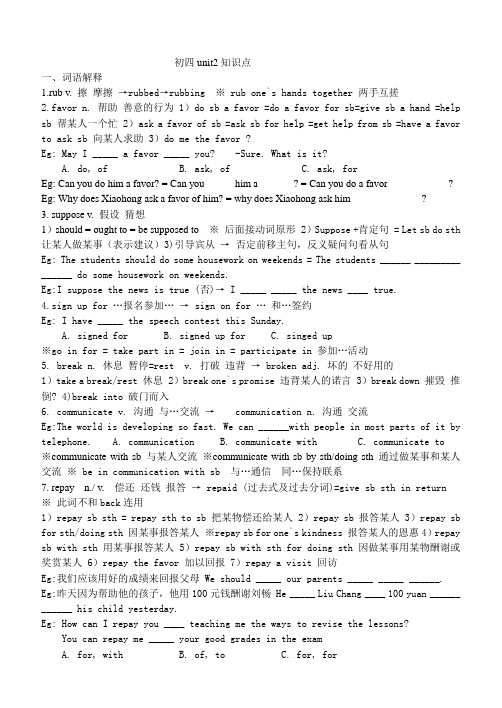Unit2(1)初四英语
- 格式:ppt
- 大小:1.17 MB
- 文档页数:7

Unit 2 Teenagers should be allowed to choose their own clothes.1.能够默写出本单元单词、词组,熟练英汉互译,能准确书写,准确运用;2.理解并记住被动语态与情态动词的基本结构;3.记住重点句型的构成及重要知识点,能准确运用。
词汇填空1.I ____________ (educate) to be a kind and helpful person from a young age.2.Failure is the mother of ___________ (succeed).3. They are all against __________ (build) a new zoo in the city.4. He didn’t sleep well, so he is very __________ (sleep) now.5. Please keep __________ (silently). The teacher is coming.1.英语有两种语态:主动语态和被动语态主动语态表示主语是动作的_________;被动语态表示主语是动作的_________。
Cats eat fish. (主动语态)猫吃鱼。
Fish is eaten by cats.(被动语态) 鱼被猫吃。
2.被动语态的构成:由“助动词be +及物动词的过去分词”构成助动词be 有人称、数和时态的变化,其变化规则与be 作为连系动词时完全一样。
3.被动语态的用法当我们不知道谁是动作的执行者,或者没有必要指出谁是动作的执行者,或者只需强调动作的承受者时,要用被动语态。
【练习】 1. -- There is a lot of wind in North China.--Well, more trees ______ every year to stop the wind.A. must be plantedB. should plantC. can plant2. --Do you believe there’s aliens?--I’m afraid not. I don’t think aliens _______ in space.A. can findB. can be foundC. can be founded3. 所有的工作必须今天完成。


初四Unit2复习提纲Unit 2一。
单词:名词:1.野餐 2. 物主 3.噪音 4. 风 5. 邻居6. 垃圾7.主管,主任8.猴子9.敌人10.气味11.手指12.石头13. 蚂蚁14.海洋15. 目的16. 胜利17.方位,位置动词: 1. 落下 2. 赶上 3.采访面试4. 举起5. 尊敬形容词:1.可能的 2.不诚实的 3. 最后的二。
重点词组,1最著名的地方之一one of the most famous places2 听音乐listen to music3 属于belong to4 去参加音乐会go to the concert5 在音乐会期间during the concert6 因为大雨because of the heavy rain7 形成make up8 尽力做某事try to do sth9 进行数学测试have a math test10 通过期末的考试pass the final exam11一个学习历史的地方 a place to learn history12 一个带相机的妇女 a woman with a camera13数千旅游者thousands of tourists14太多的作业too much homework15 玩得高兴have fun doing16 赶车catch a bus17用完use up run out of18全世界all over the world19不但。
而且。
not only……..but also两个都both------- and既不…也不…neither… nor…或者…或者…either…or…20 当心be careful of21 上飞机get on the plane下飞机get off the plane22. 庆祝伟大的胜利celebrate a great victory三。
句子1. 老师告诉我们台湾属于中国。

初四unit2知识点一、词语解释1.rub v. 擦摩擦→rubbed→rubbing ※ rub one`s hands together 两手互搓2.favor n. 帮助善意的行为 1)do sb a favor =do a favor for sb=give sb a hand =help sb 帮某人一个忙 2)ask a favor of sb =ask sb for help =get help from sb =have a favor to ask sb 向某人求助 3)do me the favor ?Eg: May I _____ a favor _____ you? -Sure. What is it?A. do, ofB. ask, ofC. ask, forEg: Can you do him a favor? = Can you _____ him a ______ ? = Can you do a favor _____ ______? Eg: Why does Xiaohong ask a favor of him? = why does Xiaohong ask him ______ _______?3. suppose v. 假设猜想1)should = ought to = be supposed to ※后面接动词原形 2)Suppose +肯定句 = Let sb do sth 让某人做某事(表示建议)3)引导宾从→否定前移主句,反义疑问句看从句Eg: The students should do some housework on weekends = The students ______ _________ ______ do some housework on weekends.Eg:I suppose the news is true (否)→ I _____ _____ the news ____ true.4.sign up for …报名参加…→ sign on for …和…签约Eg: I have _____ the speech contest this Sunday.A. signed forB. signed up forC. singed up※go in for = take part in = join in = participate in 参加…活动5. break n. 休息暂停=rest v. 打破违背→ broken adj. 坏的不好用的1)take a break/rest 休息 2)break one`s promise 违背某人的诺言 3)break down 摧毁推倒? 4)break into 破门而入6. communicate v. 沟通与…交流→ communication n. 沟通交流Eg:The world is developing so fast. We can ______with people in most parts of it by telephone. A. communication B. communicate with C. communicate to※communicate with sb 与某人交流※communicate with sb by sth/doing sth 通过做某事和某人交流※ be in communication with sb 与…通信同…保持联系7. repay n./ v. 偿还还钱报答→ repaid (过去式及过去分词)=give sb sth in return※此词不和back连用1)repay sb sth = repay sth to sb 把某物偿还给某人 2)repay sb 报答某人 3)repay sb for sth/doing sth 因某事报答某人※repay sb for one`s kindness 报答某人的恩惠4)repay sb with sth 用某事报答某人 5)repay sb with sth for doing sth 因做某事用某物酬谢或奖赏某人 6)repay the favor 加以回报 7)repay a visit 回访Eg:我们应该用好的成绩来回报父母 We should _____ our parents _____ _____ ______. Eg:昨天因为帮助他的孩子,他用100元钱酬谢刘畅 He _____ Liu Chang ____ 100 yuan ______ ______ his child yesterday.Eg: How can I repay you ____ teaching me the ways to revise the lessons?You can repay me _____ your good grades in the examA. for, withB. of, toC. for, forEg: Can you lend me 100 yuan? –Sure, but you must ____ it ___ me nest Monday.A. repay back, toB. pay, forC. repay, to8. mean v. 意思是意味着 adj. 吝啬的自私的小气的卑鄙的1)mean doing sth 意味着做某事 2)mean to do sth 打算做某事 = plan on doing sth 9. shout v. 大喊大叫※ shout at sb 冲某人大喊※shout with joy 高兴得大叫Eg:冲你的父母大喊大叫是不礼貌的 It is impolite ____ you ____ _____ _____ your parents 10.knock n./v. 敲敲门※knock on/at the door 敲门※ knock down 撞到击倒※knock out 击昏击倒 Eg: 有人敲门 There is ___ _____ ___ the door = Somebody is _____ ___ the door.11. marry v. 结婚嫁娶→ married adj. 结婚的→ marriage n. 结婚婚姻Eg: He didn`t believe in _______, so he never married1)get/be married 结婚了已婚 2)A marry B = A be/get married to B 译为:A和B结婚3)主语+marry A to B 主语把A嫁给B※在完成时中,如果出现段时间,要用be married表示。


1. represent = stand for2. let…down= disappoint sb.3. come up with = think up4. rest: the rest of the milk/studentshave a rest5. aid6. first-aid7. nearby8.shelf 复数shelvesknife 复数knives以f, fe 结尾的名词去掉f, fe 加ves9. come out10. cover (n)(vt)11. press (v) press the cut hard(n) Shandong educational press12. deep (adj) depth (n) deeply (adv)13. downstairs= upstairsGo upstairs/ downstairs.14. correct (adj) = right(v) correct the mistakes 15.burn burned burnedburn burnt burnt16. knee 复数knees17. pain (名词)- painful (形容词)help (名词)- helpful (形容词) care (名词)- careful (形容词)use (名词)- useful (形容词) 18. hurt hurt hurtMy back hurts. 我的背疼。
19. offeroffer sb. sth.=offer sth. to sb.20. refuse: refuse to do sth.21. helpful = be of help22. burn (n)23. spotty 形容词spot 名词Phrases and sentences in Unit 11. What would you do if you had a million dollars?2. What if you have a million dollars?3. I would give it to charity.give it to medical research.travel around the whole world.put it in the bank.buy snacks.buy a big house.3.be late for 迟到4. He doesn’t know what to wear.what to wear =what he should wearHe doesn’t know what he should wear.5.may might 表示猜测时might比may 的可能性要小。
一、选择题1.I want to have ______ dinner with my friends, and I also want to have ______ great dinner. A.the; a B.the; 不填C.不填; a D.不填; 不填C解析:C【解析】【详解】句意:我想和朋友一起吃晚餐,我也想要一顿丰盛的晚餐。
名词dinner意为“晚餐”,三餐前应该是零冠词,所以“吃晚饭”是have dinner,但是如果dinner前有形容词,例如great“很棒的”修饰的话,这时需要在形容词前补充不定冠词意为“一顿…”,所以“一顿丰盛的晚餐”是a great dinner,故选C。
【点睛】总结一些零冠词的用法:1) 国名、人名前通常不用定冠词:England,Mary;2)泛指的复数名词,表示一类人或事物时,可不用定冠词;They are teachers. 他们是教师。
3)抽象名词表示一般概念时,通常不加冠词;Failure is the mother of success. 失败乃成功之母。
4)物质名词表示一般概念时,通常不加冠词,当表示特定的意思时,需要加定冠词;Man cannot live without water. 人离开水就无法生存。
5)在季节、月份、节日、假日、日期、星期等表示时间的名词之前,不加冠词;We go to school from Monday to Friday. 我们从星期一到星期五都上课。
6)在称呼或表示官衔,职位的名词前不加冠词;The guards took the American to General Lee. 士兵们把这个美国人送到李将军那里。
7)在三餐、球类运动和娱乐运动的名称前,不加冠词如:have breakfast,play chess;8)当两个或两个以上名词并用时,常省去冠词;I can't write without pen or pencil. 没有钢笔和铅笔,我就写不了字。